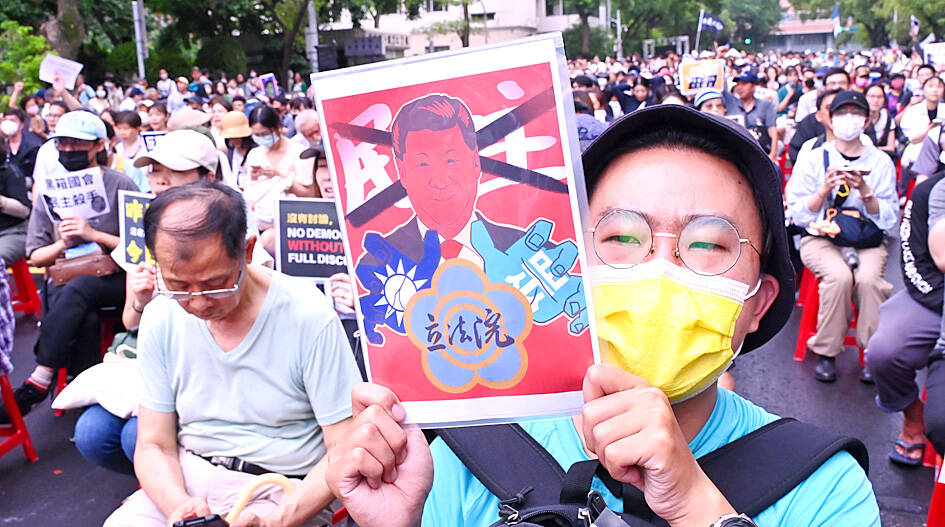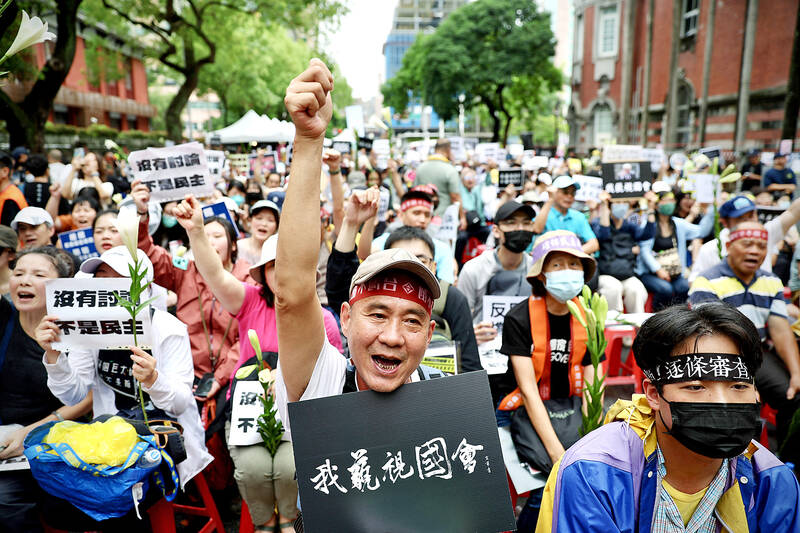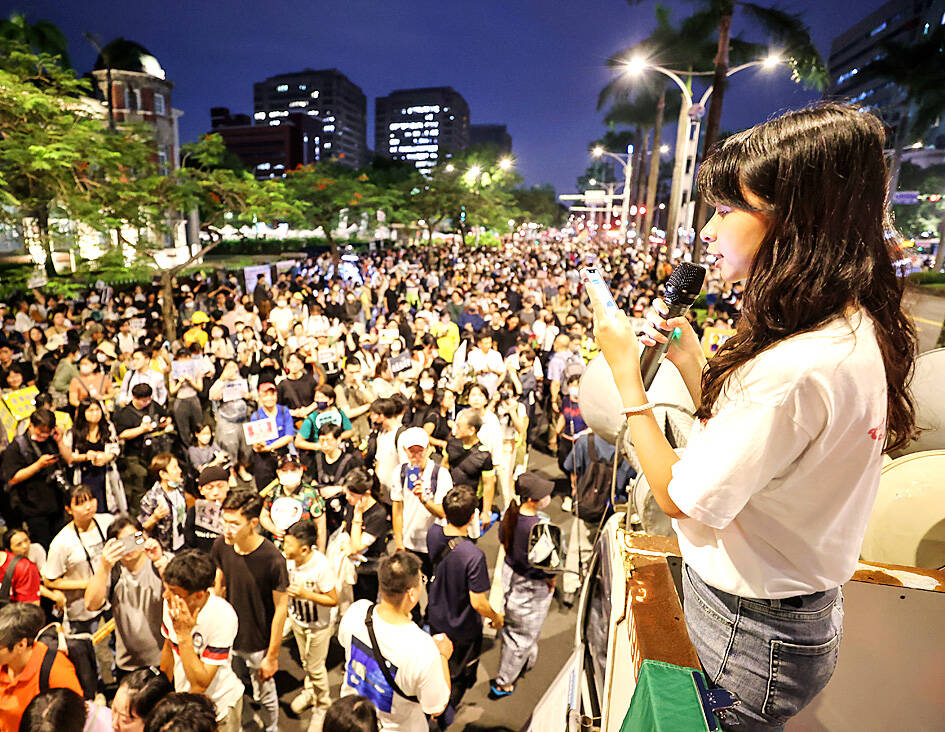Large crowds assembled around the Legislative Yuan in Taipei and other cities nationwide yesterday to protest efforts by opposition lawmakers to pass a set of controversial legislative reform bills.
More than 50 civil groups coordinated the protests, which organizers said were called to “defend Taiwan’s democracy” against efforts by the Chinese Nationalist Party (KMT) and Taiwan People’s Party (TPP) to push through bills that seek to expand the legislature’s powers of investigation and oversight over the executive branch.
Organizers estimate that more than 100,000 people had gathered outside the Legislative Yuan as of press time last night, centered around two stages on streets north and south of the chamber.

Photo: Liu Hsin-de, Taipei Times
Slogans called for citizen action to “oppose abuse of power by legislators” and “refuse ‘black box’ processes.”
Many protesters also held signs saying: “I have contempt for the legislature,” as lawmakers met inside to vote through to the third reading bills that would expand legislative powers of investigation and make it a criminal offense to be in contempt of the legislature.
Taiwan Economic Democracy Union convener Lai Chung-chiang (賴中強) when speaking on stage said that the KMT and TPP circumvented normal deliberation processes, clause-by-clause reviews and cross-party negotiations to force through to a vote, saying that many lawmakers did not even know what the bills said.

Photo: RITCHIE B. TONGO, EPA-EFE
“It is fortunate for Taiwan that many citizens are alarmed by the non-transparent ‘black box’ process, and concerned that the KMT and TPP are working to undermine our democracy,” said Lai, whose organization along with the Taiwan Citizen Front and the Alliance of Referendum for Taiwan organized the nationwide protests.
“But we shall keep protesting so our citizens can have confidence in Taiwan’s democratic system,” he said. “Even if lawmakers pass these controversial bills through the third reading to expand their power, we shall fight on to protect democracy and safeguard Taiwan.”
People can petition for a public referendum to negate the bills, as well as launch recall campaigns within their constituencies against opposition legislators, Lai said.

Photo: CNA
He also said that the Executive Yuan can veto the bills due to fiscal constraints or procedural issues.
Organizing committees and volunteers set up tents to the north and south of the Legislative Yuan and at the adjacent Chelam Presbyterian Church with stations for medical teams, where they also provided free water bottles, biscuits and other supplies for participants donated by benefactors and stockpiled at the church grounds.
Some counterprotesters attended in small numbers following calls from opposition lawmakers to take to the streets in support of the bills.
The KMT had applied to hold a protest on Qingdao E Road, where they had a stage truck set up, but only a handful of people were there through the evening.
In Kaohsiung, a march that started at Central Park (中央公園) drew more than 3,500 people, the organizers said.
Protests were also held in other central and southern cities, drawing smaller crowds of about 500 in Taichung and Changhua, about 300 in Tainan, 200 in Chiayi and 100 in Taitung, organizers said.
The Presbyterian Church of Taiwan also organized “Pray for Taiwan” events at 7pm yesterday at the Chelam Presbyterian Church in Taipei, along with selected church sessions in Taoyuan, Taichung and Tainan.

DEFENSE: The National Security Bureau promised to expand communication and intelligence cooperation with global partners and enhance its strategic analytical skills China has not only increased military exercises and “gray zone” tactics against Taiwan this year, but also continues to recruit military personnel for espionage, the National Security Bureau (NSB) said yesterday in a report to the Legislative Yuan. The bureau submitted the report ahead of NSB Director-General Tsai Ming-yen’s (蔡明彥) appearance before the Foreign and National Defense Committee today. Last year, the Chinese People’s Liberation Army (PLA) conducted “Joint Sword-2024A and B” military exercises targeting Taiwan and carried out 40 combat readiness patrols, the bureau said. In addition, Chinese military aircraft entered Taiwan’s airspace 3,070 times last year, up about

The Overseas Community Affairs Council (OCAC) yesterday announced a fundraising campaign to support survivors of the magnitude 7.7 earthquake that struck Myanmar on March 28, with two prayer events scheduled in Taipei and Taichung later this week. “While initial rescue operations have concluded [in Myanmar], many survivors are now facing increasingly difficult living conditions,” OCAC Minister Hsu Chia-ching (徐佳青) told a news conference in Taipei. The fundraising campaign, which runs through May 31, is focused on supporting the reconstruction of damaged overseas compatriot schools, assisting students from Myanmar in Taiwan, and providing essential items, such as drinking water, food and medical supplies,

A magnitude 4.3 earthquake struck eastern Taiwan's Hualien County at 8:31am today, according to the Central Weather Administration (CWA). The epicenter of the temblor was located in Hualien County, about 70.3 kilometers south southwest of Hualien County Hall, at a depth of 23.2km, according to the administration. There were no immediate reports of damage resulting from the quake. The earthquake's intensity, which gauges the actual effect of a temblor, was highest in Taitung County, where it measured 3 on Taiwan's 7-tier intensity scale. The quake also measured an intensity of 2 in Hualien and Nantou counties, the CWA said.

New Party Deputy Secretary-General You Chih-pin (游智彬) this morning went to the National Immigration Agency (NIA) to “turn himself in” after being notified that he had failed to provide proof of having renounced his Chinese household registration. He was one of more than 10,000 naturalized Taiwanese citizens from China who were informed by the NIA that their Taiwanese citizenship might be revoked if they fail to provide the proof in three months, people familiar with the matter said. You said he has proof that he had renounced his Chinese household registration and demanded the NIA provide proof that he still had Chinese